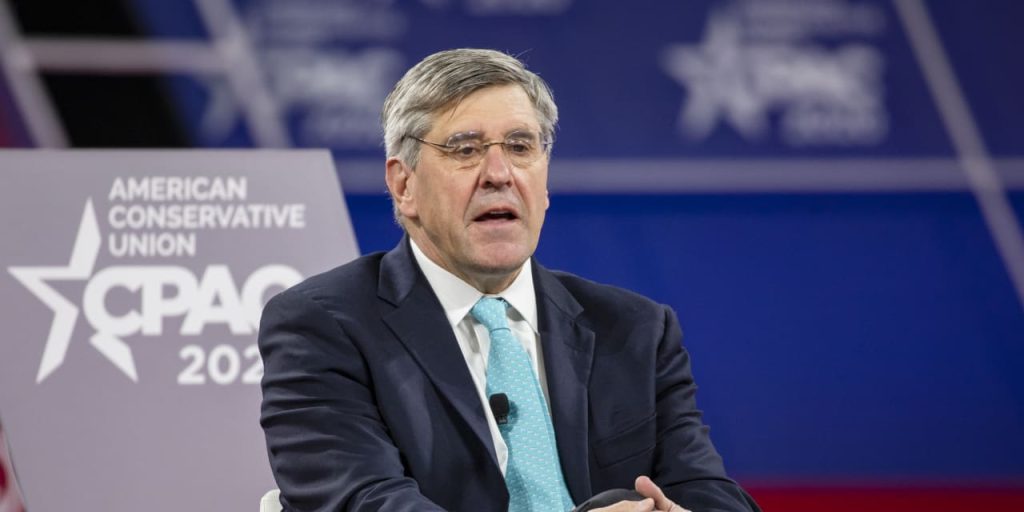Donald Trump’s tariff infatuation has only intensified in the years since he was voted out of the White House.
The former president appears to be well on his way to securing the Republican nomination for president for a third time, and a central policy pitch of his campaign is to institute an across-the-board 10% tariff on imported goods, which, he claims, will protect American companies and workers from unfair foreign competition.
There is perhaps no issue that sets Trump apart from his Republican allies more than his enthusiasm for tariffs, and longtime GOP policy hands — while not exactly embracing the idea — are reconciling themselves to it and mapping out how a new tariff regime might fit into a broader pro-growth economic agenda.
Don’t miss: Trump’s proposal of 10% tariff would be $300 billion tax on Americans, think tank says
Trump economic adviser Stephen Moore is one of those veterans of Republican policy circles who is trying to look on the bright side.
“I’m not in favor of the tariff, but he is,” Moore told MarketWatch in a phone interview. “One of the things that I’ve said to Trump is that, if we have to do it, let’s make it part of a package to pay for other things, like making his tax cuts permanent.”
No matter who wins the November election, tax policy will be a major priority, given that many of the provisions in the 2017 tax-code rewrite are set to expire starting at the end of 2025, with most of the provisions affecting individual taxpayers slated to sunset.
From the archives (December 2017): Homeowners rush to prepay property taxes before Republican tax law’s limits on ‘SALT’ deductions kick in
Also (December 2019): Democratic-leaning states say they felt intentionally targeted by Trump tax law
If Congress and the president don’t act to extend these provisions, U.S. families and businesses could be hit with steep tax increases.
While Trump and some in the conservative movement have proposed cutting corporate tax rates further, Moore believes, he said, that it will be a battle simply to keep the top corporate rate — which was brought down from 35% by the 2017 law — where it is, at 21%.
Moore said that, in recent conversations, Trump has expressed a desire to emphasize the tax treatment of small businesses if he were to win a nonconsecutive second term, which could mean putting up a fight to make a 20% deduction on pass-through business income permanent.
The pass-through deduction is especially important for owners of small businesses, which are often organized as pass-through entities, whose income flows through businesses to the personal returns of their owners.
Tax Guy (July 2022): How small business owners can maximize a potentially lucrative tax break
Read more: Trump tax cut 2.0: Would slashing the corporate rate again boost stocks?
Paying for the extension of these tax cuts may prove difficult, as Trump has vowed that, if he is elected, he won’t cut Social Security or Medicare, two of the biggest components of the federal budget.
Trump has called for new tariffs of 10% on all imports, a move that could raise upwards of $300 billion per year, according to the Tax Foundation, which characterizes the arrangement as a $300 billion tax on Americans. The Trump campaign — breaking with most orthodox economists — maintains that it’s foreign exporters, not U.S. consumers, who ultimately pay the tab for tariffs.
Opinion (November 2023): Only two Republican candidates have been honest about fixing Social Security
Those hundreds of billions of dollars, in any event, represent the sort of money that could help pay for making the 2017 tax cuts permanent, which Moore said he believes would boost business investment, create jobs and partially offset the negative effects of tariffs, including higher prices for consumer goods.
Moore characterized tariffs as a “consumption tax on things you import” that, he conceded, will be paid at least in part by Americans, but he dismissed criticisms that the policy would ignite a trade war.
Other countries already have broad-based consumption taxes, known as a value-added tax, or VAT, that raises the price of U.S. exports, he said. “What Trump says, and I agree with him, is that we’re in a trade war already,” Moore said. “Trump would say we’re just leveling the playing field.”
From the archives (August 2022): Here’s how private equity got relief in Democrats’ healthcare, climate and tax package
Also see (March 2023): Biden’s tax hikes on high earners are unlikely to make it through Congress. A bigger debate: the Trump-era tax cuts that expire in 2025.
Read the full article here







